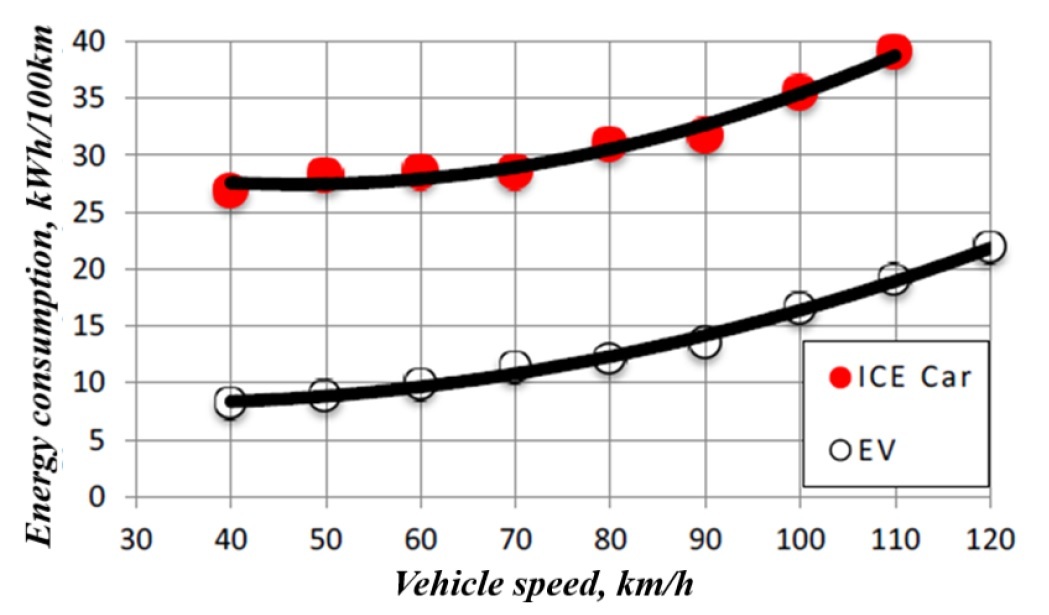Current issue
Online first
Archive
About the Journal
Aims and scope
Publisher and Editorial
Advertising policy
For Authors
Paper review procedures
Procedures protecting authentic authorship of papers
Paper preparation manual
Plagiarism check
Publication ethics
Reviewers
APC
Editorial and Scientific Board
Contact
Reviewers
Analysis of speed limit and energy consumption in electric vehicles
1
Katedra Pojazdów, Politechnika Opolska, Poland
2
Thermodynamik, Thermische Verfahrenstechnik, Universitäten Stuttgart, Germany
3
Zarząd, Zakład Komunalny sp. z o.o., Poland
Submission date: 2023-05-30
Final revision date: 2023-07-03
Acceptance date: 2023-07-07
Online publication date: 2023-08-19
Publication date: 2023-11-11
Corresponding author
Combustion Engines 2023,195(4), 83-89
KEYWORDS
TOPICS
ABSTRACT
This paper presents an analysis of the mileage energy consumption for an electric passenger vehicle in terms of the introduction of numerous speed limits. Regulations concerning the limiting of vehicle speed to 30 km/h in cities or residential areas are particularly common. This restriction is intended to increase traffic safety, but at the same time introduces increased mileage fuel or energy consumption in electric drivetrain. Regardless of the energy carrier, any increase in energy causes negative effects for the environment. The analysis was focused on the mileage energy consumption of electric passenger cars for a constant speed under real traffic conditions. During the tests, the tested vehicles’ speed on a specially designated road section was changed gradually by 10 km/h, with simultaneous recording of the car’s traction parameters and mileage energy consumption. An analysis of the mileage energy consumption was then carried out for the assumed fleet of cars travelling one after another (in a so-called traffic jam), while maintaining a safe distance. This allowed for the calculation of the environment’s energy burden caused by a fleet of vehicles travelling on a given road section, indicating that a reduction in vehicle speed causes an increase in the vehicles’ energy consumption. Both total and mileage energy consumption of electric vehicles were analysed during the tests.
REFERENCES (17)
1.
Andrych-Zalewska M, Chłopek Z, Merkisz J, Pielecha J. Determination of exhaust emission characteristics in the RDE test using the Monte Carlo method. Archives of Transport. 2023;66(2):45-60. https://doi.org/10.5604/01.300....
2.
Andrzejewski M, Nowak M, Woch A, Stefańska N. Analysis of pollutant emissions and fuel consumption for the use of a multi-storey carpark. Combustion Engines. 2021;187(4):46-51. https://doi.org/10.19206/CE-14....
3.
Becker T, Sidhu I, Tenderich B. Electric vehicles in the United States: a new model with forecasts to 2030. Center for Entrepreneurship & Technology (CET), Technical Brief 2009.
4.
Bieniek A, Graba M, Hennek K, Mamala J. Analysis of fuel consumption of a spark ignition engine in the conditions of a variable load. MATEC Web Conf. 2017;118:00036. https://doi.org/10.1051/matecc....
6.
Chłopek Z. Evaluation of specific distance energy consumption by electric car. Car Transport/Transport Samochodowy. 2013;2:75-87.
7.
Fiori C, Arcidiacono V, Fontaras G, Makridis M, Mattas K, Marzano V et al. The effect of electrified mobility on the relationship between traffic conditions and energy consumption. Transport Res D-Tr E. 2019;67:275-290. https://doi.org/10.1016/j.trd.....
8.
Gagan S. Unit energy consumption model of vehicles in real operating conditions. Engineering thesis, Opole University of Technology 2022. https://apd.po.edu.pl/diplomas....
9.
Graba M, Bieniek A, Prażnowski K, Hennek K, Mamala J, Burdzik R et al. Analysis of energy efficiency and dynamics during car acceleration. Eksploat Niezawodn. 2023;25(1):17. https://doi.org/10.17531/ein.2....
10.
Kropiwnicki J. Comparison of energy efficiency of vehicles powered by different fuels. Combustion Engines. 2012;150(3):34-43. https://doi.org/10.19206/CE-11....
11.
Kropiwnicki J, Furmanek M. Analysis of the regenerative braking process for the urban traffic conditions. Combustion Engines. 2019;178(3):203-207. https://doi.org/10.19206/CE-20....
12.
Lisowski M, Gołębiewski W, Prajwowski K, Danilecki K, Radwan M. Modeling the fuel consumption by a HEV vehicle – a case study. Combustion Engines. 2023;193(2):71-83. https://doi.org/10.19206/CE-15....
13.
Martins J, Brito FP, Pedrosa D, Monteiro V, Afonso JL. Real-life comparison between diesel and electric car energy consumption. Grid Electrified Vehicles: Performance, Design and Environmental Impacts, Nova Science Publishers, New York 2013.
14.
Mitrovic J. Optimum speed of road vehicles in terms of fuel consumption. Immissionsschutz 2020;1. https://doi.org/10.37307/j.186....
16.
Wang J, Besselink I, Nijmeijer H. Electric vehicle energy consumption modelling and prediction based on road information. World Electr Veh J. 2015;7(3):447-458. https://doi.org/10.3390/wevj70....
17.
Zhang J, Wang Z, Liu P, Zhang Z. Energy consumption analysis and prediction of electric vehicles based on real-world driving data. Appl Energ. 2020;275:115408. https://doi.org/10.1016/j.apen....
CITATIONS (2):
1.
Formula Student class electric vehicle energy storage - study and design assumptions
Piotr Hemlecki, Paweł Fabiś
Combustion Engines
Piotr Hemlecki, Paweł Fabiś
Combustion Engines
2.
Response of hydrogen charging diffusion of the austenitic stainless steel AISI 310s
Małgorzata Julia Rutkowska-Gorczyca, Mateusz Dziubek, Marcin Wiśniewski
Combustion Engines
Małgorzata Julia Rutkowska-Gorczyca, Mateusz Dziubek, Marcin Wiśniewski
Combustion Engines
Share
RELATED ARTICLE
We process personal data collected when visiting the website. The function of obtaining information about users and their behavior is carried out by voluntarily entered information in forms and saving cookies in end devices. Data, including cookies, are used to provide services, improve the user experience and to analyze the traffic in accordance with the Privacy policy. Data are also collected and processed by Google Analytics tool (more).
You can change cookies settings in your browser. Restricted use of cookies in the browser configuration may affect some functionalities of the website.
You can change cookies settings in your browser. Restricted use of cookies in the browser configuration may affect some functionalities of the website.



